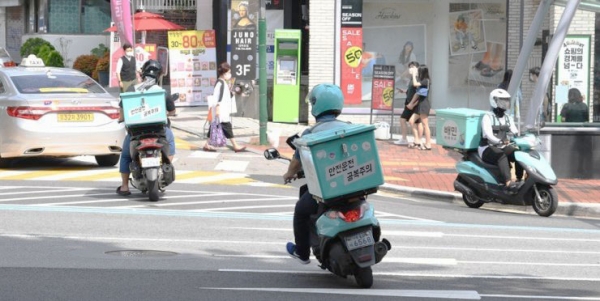
Controversy over delivery fees has become a hot topic as major delivery apps have suspended promotions. Coupang Eats (a popular delivery application) launched a food delivery service in May 2019 and brought in a “single-order-per-delivery” system.
Previously, it was common for deliverers to handle three to four cases of orders at once. Single deliveries could solve the problem of delays and food cooling. It had a short delivery time because only one order was handled at a time.
The condition of the single delivery was 15% of the fee and 6,000 KRW for delivery, but Coupang Eats offered a promotion of 1,000 KRW for the fee and 5,000 KRW for delivery. The promotion lasted for 26 months until February.
As Coupang Eats increased its market share at a rapid pace, Baemin also carried out a single delivery promotion in June last year. The single delivery condition was 12% of the fee and 6,000 KRW for delivery, but the fee was promoted to 1,000 KRW for the fee and 5,000 KRW for delivery. Baemin stopped the promotion after 10 months at the end of March.
The reason that these apps stopped promotions is operating losses. According to the Financial Supervisory Service’s announcement, Baemin’s operating profit plunged from a surplus of 52.5 billion KRW to a deficit of 75.7 billion KRW. Delivery applications stopped promotiions but still claim that they demand the lowest fee worldwide. In fact, DoorDash and GrubHub, the top two delivery apps in the U.S., collect fees of 15 to 30%, respectively.
However, the restaurant owners have a different opinion. For example, if they received a food order of 20,000 KRW through Baemin, they previously paid a total of 6,000 KRW (1,000 KRW for the fee and 5,000 KRW for delivery), but now they have to pay 7,360 KRW (1,360 KRW for the fee and 6,000 KRW for delivery). The cost burden will increase by 22%. Even if they receive the same order through Coupang Eats, they will have to pay 7,360 KRW (1,960 KRW for the fee and 5,400 KRW for delivery).
Professor Kim Byung-In of the Department of Industrial and Management Engineering said, "In an era of emphasis on ESG (Environment, Social, Government), delivery service companies will have to find ways to win over consumers, restaurant owners, and delivery drivers. Rather than continuous competition, it is possible to consider ways to reduce delivery costs through optimization of the delivery system. Also, I think the government and society need to pool their wisdom to provide safeguards to prevent excessive competition.”


